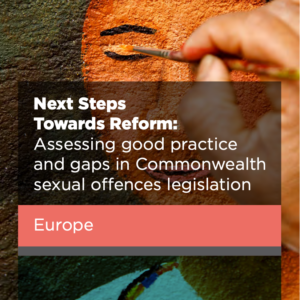Terminology in sexual assault laws is legal and not moralistic. Sexual offences provisions should use neutral and precise legal terminology that is not moralistic and does not perpetuate discriminatory stereotypes.
Use of terms such as ‘defilement’, ‘insulting modesty’, ‘offences against morality’ or ‘honour’ and ‘indecent assault’ are used to describe sexual offences in the criminal laws of many Commonwealth countries. For example, the crime of ‘defilement’ is an archaic concept meaning ‘to pollute’ or ‘to sully’ and, in the context of sexual offences, usually refers to the sexual assault of girls. It is a discriminatory term as it indicates that girls are ‘spoilt’ or ‘damaged’ through the loss of their virginity. Properly viewed, the rape and sexual assault of any person are attacks against their physical and mental integrity and sexual autonomy. They are unrelated to the ‘modesty’ or ‘honour’ of the victim/survivor or their family.



